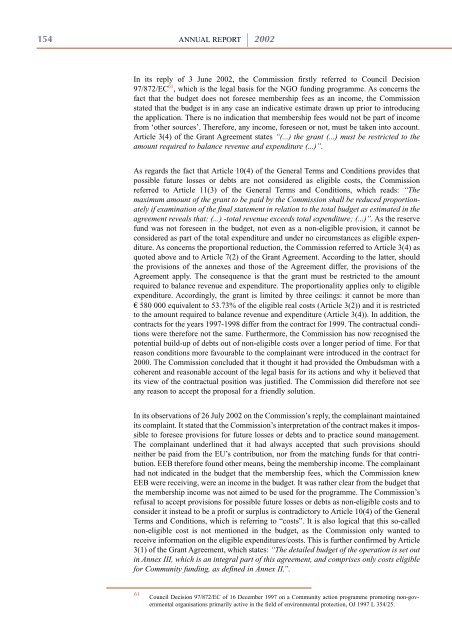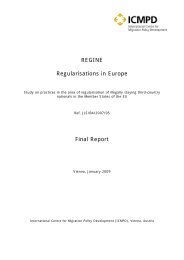Annual report 2002 - EOI
Annual report 2002 - EOI
Annual report 2002 - EOI
Create successful ePaper yourself
Turn your PDF publications into a flip-book with our unique Google optimized e-Paper software.
154 ANNUAL REPORT | <strong>2002</strong><br />
In its reply of 3 June <strong>2002</strong>, the Commission firstly referred to Council Decision<br />
97/872/EC 61 ,which is the legal basis for the NGO funding programme. As concerns the<br />
fact that the budget does not foresee membership fees as an income, the Commission<br />
stated that the budget is in any case an indicative estimate drawn up prior to introducing<br />
the application. There is no indication that membership fees would not be part of income<br />
from ‘other sources’. Therefore, any income, foreseen or not, must be taken into account.<br />
Article 3(4) of the Grant Agreement states “(...) the grant (...) must be restricted to the<br />
amount required to balance revenue and expenditure (...)”.<br />
As regards the fact that Article 10(4) of the General Terms and Conditions provides that<br />
possible future losses or debts are not considered as eligible costs, the Commission<br />
referred to Article 11(3) of the General Terms and Conditions, which reads: “The<br />
maximum amount of the grant to be paid by the Commission shall be reduced proportionately<br />
if examination of the final statement in relation to the total budget as estimated in the<br />
agreement reveals that: (...) -total revenue exceeds total expenditure; (...)”. As the reserve<br />
fund was not foreseen in the budget, not even as a non-eligible provision, it cannot be<br />
considered as part of the total expenditure and under no circumstances as eligible expenditure.<br />
As concerns the proportional reduction, the Commission referred to Article 3(4) as<br />
quoted above and to Article 7(2) of the Grant Agreement. According to the latter, should<br />
the provisions of the annexes and those of the Agreement differ, the provisions of the<br />
Agreement apply. The consequence is that the grant must be restricted to the amount<br />
required to balance revenue and expenditure. The proportionality applies only to eligible<br />
expenditure. Accordingly, the grant is limited by three ceilings: it cannot be more than<br />
€ 580 000 equivalent to 53.73% of the eligible real costs (Article 3(2)) and it is restricted<br />
to the amount required to balance revenue and expenditure (Article 3(4)). In addition, the<br />
contracts for the years 1997-1998 differ from the contract for 1999. The contractual conditions<br />
were therefore not the same. Furthermore, the Commission has now recognised the<br />
potential build-up of debts out of non-eligible costs over a longer period of time. For that<br />
reason conditions more favourable to the complainant were introduced in the contract for<br />
2000. The Commission concluded that it thought it had provided the Ombudsman with a<br />
coherent and reasonable account of the legal basis for its actions and why it believed that<br />
its view of the contractual position was justified. The Commission did therefore not see<br />
any reason to accept the proposal for a friendly solution.<br />
In its observations of 26 July <strong>2002</strong> on the Commission’s reply, the complainant maintained<br />
its complaint. It stated that the Commission’s interpretation of the contract makes it impossible<br />
to foresee provisions for future losses or debts and to practice sound management.<br />
The complainant underlined that it had always accepted that such provisions should<br />
neither be paid from the EU’s contribution, nor from the matching funds for that contribution.<br />
EEB therefore found other means, being the membership income. The complainant<br />
had not indicated in the budget that the membership fees, which the Commission knew<br />
EEB were receiving, were an income in the budget. It was rather clear from the budget that<br />
the membership income was not aimed to be used for the programme. The Commission’s<br />
refusal to accept provisions for possible future losses or debts as non-eligible costs and to<br />
consider it instead to be a profit or surplus is contradictory to Article 10(4) of the General<br />
Terms and Conditions, which is referring to “costs”. It is also logical that this so-called<br />
non-eligible cost is not mentioned in the budget, as the Commission only wanted to<br />
receive information on the eligible expenditures/costs. This is further confirmed by Article<br />
3(1) of the Grant Agreement, which states: “The detailed budget of the operation is set out<br />
in Annex III, which is an integral part of this agreement, and comprises only costs eligible<br />
for Community funding, as defined in Annex II.”.<br />
61<br />
Council Decision 97/872/EC of 16 December 1997 on a Community action programme promoting non-governmental<br />
organisations primarily active in the field of environmental protection, OJ 1997 L 354/25.
















